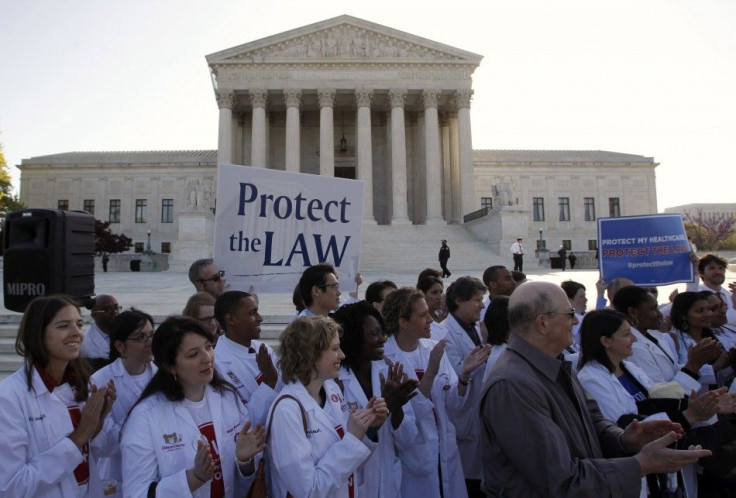Supreme Court Likely To Advance Health Care Case After 1st Day of Arguments

The U.S. Supreme Court began three days of oral arguments over President Barack Obama's 2010 law overhauling the nation's health care system law with a 90-minute discussion Monday as to whether the court even has authority to consider the case.
Lawyers representing the Obama administration and the 26 states challenging the law -- formally the Patient Protection and Affordable Care Act -- both argued that the high court should hear the case now. The nine justices appeared receptive to those arguments, according to a report of the proceedings available on the Supreme Court's official blog.
That suggests the court might reject an argument by Robert Long, an outside Washington lawyer who was set to argue that the Supreme Court but no lower court has jurisdiction to rule on challenges to the law's individual mandate. That is the core element of the legislation -- whether the Constitution allows the government to force Americans, under threat of penalty, to obtain health insurance.
The individual mandate, if upheld by the court, would take effect in 2014. On Monday the court heard debate over whether people can challenge the mandate before paying the penalty and seeking a refund.
The question stems from the Tax Anti-Injunction Act, an 1867 law that says Americans can't challenge a tax until it has been applied and collected. Long, who was asked to make his argument first, told the justices that the court couldn't rule in this case because the 19th century law shuts the door to any lawsuit against a tax before that tax has taken effect.
Solicitor General Donald Verrilli, arguing on behalf of the Obama administration, rebutted the contention that the individual mandate is a tax under the definition of the 1867 law. The court's official Scotus Blog reported that Verrilli emphasized that he was arguing on behalf of an executive branch that hopes to have a legal ruling about the mandate as soon as possible.
In the health care law, Congress called the mandate's required payment a penalty, rather than a tax. However, the penalty is contained in the Internal Revenue Code, according to multiple reports, while the actual legislation says the penalty is to be assessed and collected in the same manner as a tax.
Verrilli's remarks could potentially be a roadblock for the argument he is set to make Tuesday when the court reconvenes. The solicitor general is expected to argue that the mandate was authorized not only by Congress's power under the Constitution's commerce clause, but also by the power of the national legislature to levy taxes.
Justice Samuel Alito wasn't afraid to point out that discrepancy on Monday, according to a transcript of the oral arguments.
Today you are arguing that the penalty is not a tax, he said. Tomorrow you will be back and arguing that the penalty is a tax.
Despite the comment, Scotus Blog reported that the court's exchange Monday indicated the justices were prepared to rule on the constitutionally of the mandate, which will be taken up Tuesday.
© Copyright IBTimes 2024. All rights reserved.





















